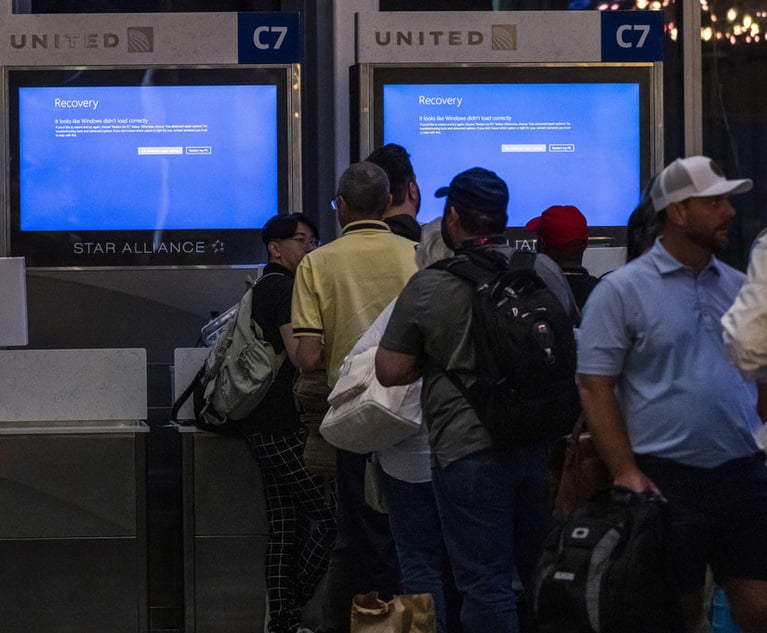Retail Litigation Center 'Cautiously Optimistic' About Supreme Court's Amex Case
The general counsel of the group, which includes many major retailers and their top legal officers, said she hopes the court will rule against Amex in the case over the credit card company's alleged anti-steering practices.
February 27, 2018 at 01:12 PM
4 minute read
 Photo Credit: Mike Scarcella / ALM
Photo Credit: Mike Scarcella / ALM
The U.S. Supreme Court justices Monday heard oral arguments in Ohio v. American Express, a case that deals with whether the credit card giant should change its supposed anti-steering practices.
Deborah White, general counsel of the Retail Industry Leaders Association and president of sister organization Retail Litigation Center, said she is hopeful that five of the justices will rule against New York-based American Express Co. RILA and the litigation center represent the interests of some of the nation's biggest retailers.
At the heart of the issue before the Supreme Court is whether Amex's contract provisions with merchants stifle competition. The company, which holds about 26 percent of the market for credit card transactions, has contracts in place that require merchants to agree to pay a higher fee for Amex transactions, but they are not allowed to tell customers this policy is in place. Retailers have taken issue with the fact that they are barred from promoting the use of other credit cards that have lower fees.
White and many prominent retailers have fought for years to have Amex lift its restrictions, most recently asking the high court to overturn the U.S. Court of Appeals for the Second Circuit's decision to allow Amex's practice to stay in place.
In-house lawyers from Walmart Stores Inc., Target Corp., The Home Depot Inc., Sears Holdings Management Corp. and Jo-Ann Stores signed onto an amicus brief with RILA, which was filed in December.
“Amex prohibits merchants from truthfully telling their customers that Amex is a higher-fee credit card,” the Dec. 14 brief stated. “It likewise prohibits merchants from giving their customers any incentive to pay with lower-fee cards … Amex's so-called Non-Discrimination Provisions (NDPs)—actually restrain competition among card networks, cause merchants to pay them higher fees and lead to increased prices for all consumers whether they pay by card, cash, check or using government benefits.”
The brief continued, “On the merchant side, Amex has prevented other card networks from competing on price. On the cardholder side, Amex prohibits consumers from receiving truthful information and the price signals that they would ordinarily receive in a competitive market … As we move ever closer to a purely electronic economy, the opportunities and incentives for those with market power to throttle competition will be manifold. This court should not invite such abuses.”
The National Retail Federation, another major retailers' group, was among those that signed on to the Dec. 14 brief as well.
“Transparency is a vital first step toward bringing credit card swipe fees under control,” NRF general counsel Stephanie Martz said in a statement in December. “These rules amount to a gag order on retailers educating their customers about the high cost of credit card fees or encouraging them to use cards that carry lower fees.”
In Monday's arguments, the justices spent a significant amount of time trying to clarify what constitutes an antitrust violation in the context of this case, and how the analysis should be conducted. White, in an interview with Corporate Counsel Monday, said that after attending and hearing the oral arguments, she is “cautiously optimistic that enough of the justices recognize the challenges that anti-steering rules place in terms of competition and how those rules disadvantage consumers at the end of the day.”
White was encouraged by the line of “cogent” questioning presented by Justices Sonia Sotomayor and Elena Kagan.
“They really demonstrated clarity and understanding of the real-world impact of the case and what that meant in terms of antitrust and for consumers,” White said Monday, noting that she is looking forward to an opinion, which she anticipates will come down in June.
Justice Neil Gorsuch appeared to show the most support for Amex and started the hour-long arguments by pressing hard with his questions directed at Eric Murphy, state solicitor representing Ohio and the 11 other states that brought this litigation.
Malcolm Stewart, deputy solicitor general for the U.S. Department of Justice, argued on behalf of the federal government, and Evan Chesler, partner and chairman with Cravath, Swaine & Moore, argued on behalf of Amex.
This content has been archived. It is available through our partners, LexisNexis® and Bloomberg Law.
To view this content, please continue to their sites.
Not a Lexis Subscriber?
Subscribe Now
Not a Bloomberg Law Subscriber?
Subscribe Now
NOT FOR REPRINT
© 2025 ALM Global, LLC, All Rights Reserved. Request academic re-use from www.copyright.com. All other uses, submit a request to [email protected]. For more information visit Asset & Logo Licensing.
You Might Like
View All
Baker Botts' Biopharma Client Sues Former In-House Attorney, Others Alleging Extortion Scheme

VW Legal Veteran Known as Bridge-Builder Promoted to US General Counsel

Trending Stories
- 1JetBlue Airways Will Pay $2M to Settle DOT Charges of Chronically Delayed Flights
- 2Texas Insurer Slaps Hinshaw & Culbertson With Legal Mal Claim Over $11 Million Personal Injury Jury Award
- 3Anti-Abortion Groups' Challenge to New York's 'Boss Bill' Is Returning to Federal Trial Court
- 4Meet the New Members of the Senate Judiciary Committee
- 5Akin Taps Orrick Partner in Growing New Capital Solutions Team
Who Got The Work
Michael G. Bongiorno, Andrew Scott Dulberg and Elizabeth E. Driscoll from Wilmer Cutler Pickering Hale and Dorr have stepped in to represent Symbotic Inc., an A.I.-enabled technology platform that focuses on increasing supply chain efficiency, and other defendants in a pending shareholder derivative lawsuit. The case, filed Oct. 2 in Massachusetts District Court by the Brown Law Firm on behalf of Stephen Austen, accuses certain officers and directors of misleading investors in regard to Symbotic's potential for margin growth by failing to disclose that the company was not equipped to timely deploy its systems or manage expenses through project delays. The case, assigned to U.S. District Judge Nathaniel M. Gorton, is 1:24-cv-12522, Austen v. Cohen et al.
Who Got The Work
Edmund Polubinski and Marie Killmond of Davis Polk & Wardwell have entered appearances for data platform software development company MongoDB and other defendants in a pending shareholder derivative lawsuit. The action, filed Oct. 7 in New York Southern District Court by the Brown Law Firm, accuses the company's directors and/or officers of falsely expressing confidence in the company’s restructuring of its sales incentive plan and downplaying the severity of decreases in its upfront commitments. The case is 1:24-cv-07594, Roy v. Ittycheria et al.
Who Got The Work
Amy O. Bruchs and Kurt F. Ellison of Michael Best & Friedrich have entered appearances for Epic Systems Corp. in a pending employment discrimination lawsuit. The suit was filed Sept. 7 in Wisconsin Western District Court by Levine Eisberner LLC and Siri & Glimstad on behalf of a project manager who claims that he was wrongfully terminated after applying for a religious exemption to the defendant's COVID-19 vaccine mandate. The case, assigned to U.S. Magistrate Judge Anita Marie Boor, is 3:24-cv-00630, Secker, Nathan v. Epic Systems Corporation.
Who Got The Work
David X. Sullivan, Thomas J. Finn and Gregory A. Hall from McCarter & English have entered appearances for Sunrun Installation Services in a pending civil rights lawsuit. The complaint was filed Sept. 4 in Connecticut District Court by attorney Robert M. Berke on behalf of former employee George Edward Steins, who was arrested and charged with employing an unregistered home improvement salesperson. The complaint alleges that had Sunrun informed the Connecticut Department of Consumer Protection that the plaintiff's employment had ended in 2017 and that he no longer held Sunrun's home improvement contractor license, he would not have been hit with charges, which were dismissed in May 2024. The case, assigned to U.S. District Judge Jeffrey A. Meyer, is 3:24-cv-01423, Steins v. Sunrun, Inc. et al.
Who Got The Work
Greenberg Traurig shareholder Joshua L. Raskin has entered an appearance for boohoo.com UK Ltd. in a pending patent infringement lawsuit. The suit, filed Sept. 3 in Texas Eastern District Court by Rozier Hardt McDonough on behalf of Alto Dynamics, asserts five patents related to an online shopping platform. The case, assigned to U.S. District Judge Rodney Gilstrap, is 2:24-cv-00719, Alto Dynamics, LLC v. boohoo.com UK Limited.
Featured Firms
Law Offices of Gary Martin Hays & Associates, P.C.
(470) 294-1674
Law Offices of Mark E. Salomone
(857) 444-6468
Smith & Hassler
(713) 739-1250







